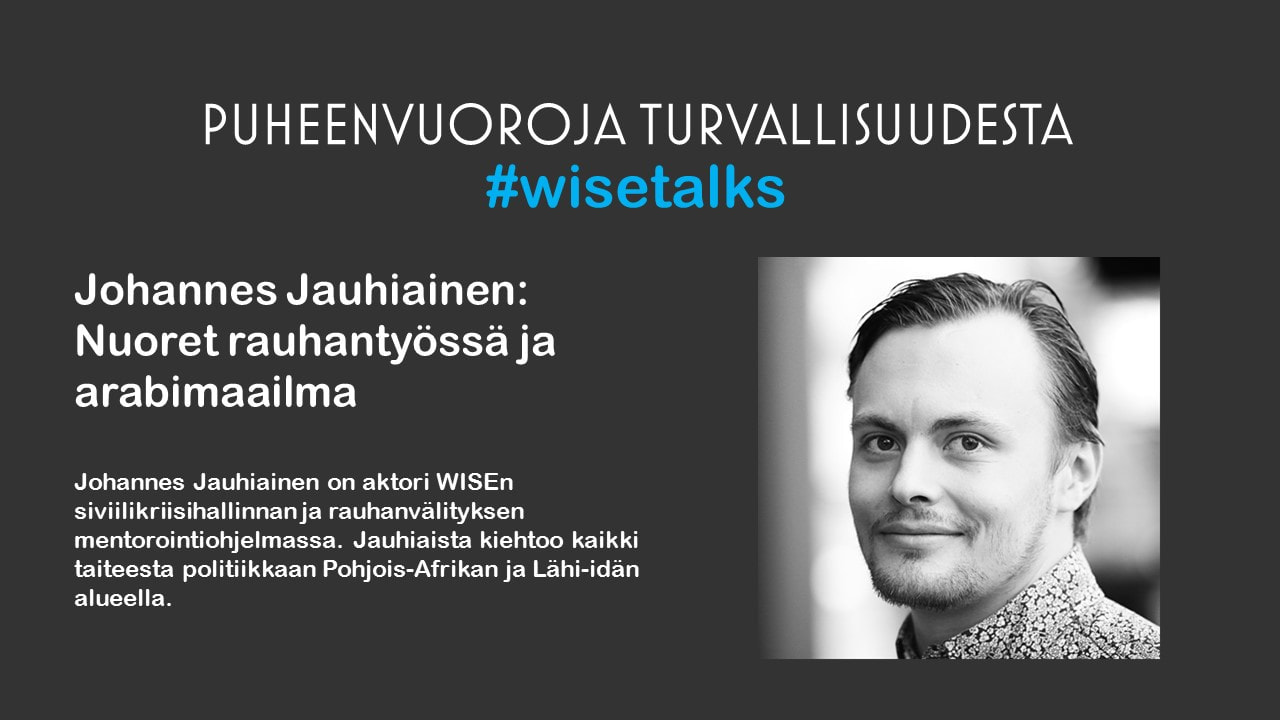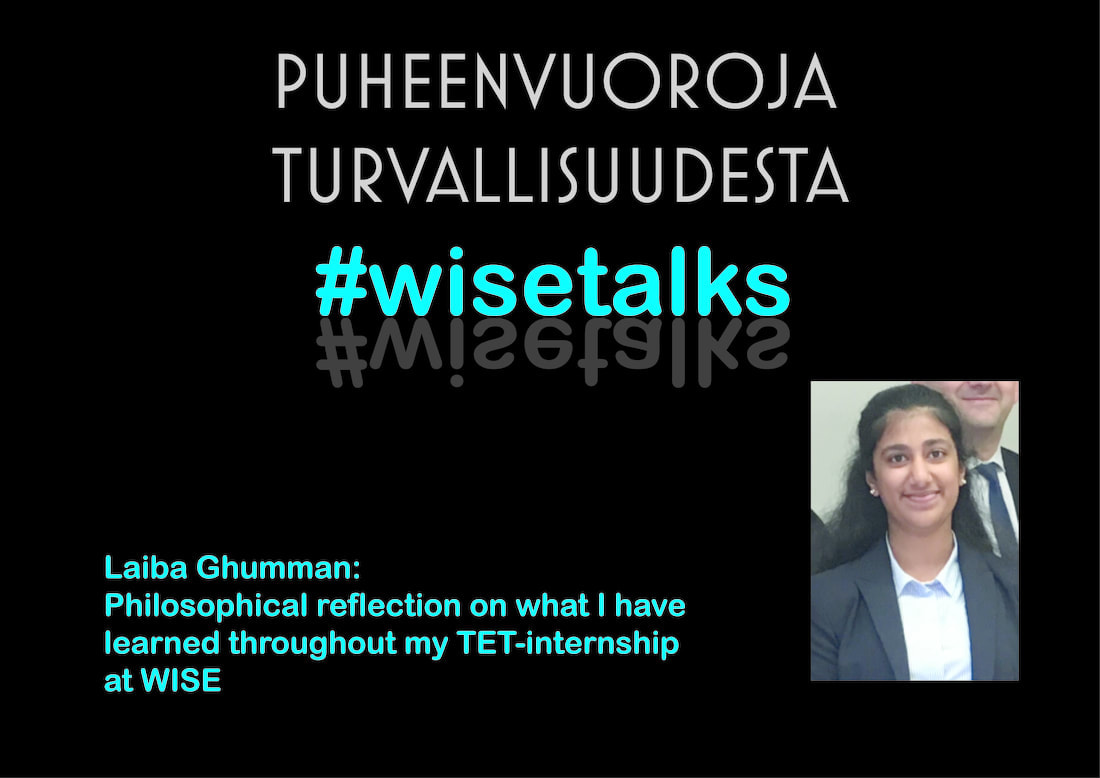|
Nuori valtiotieteilijä, rauhanturvaaja ja sosiaalityöntekijä astuu kahvilaan ja tilaavat…
Näin alkaa joko kökkö vitsi tai rauhanvälityksen seminaarin jälkipuinti. Sillä enää ei uskota, että turvallisuutta luodaan (vain) sillä, että sotilaat potkaisevat ulko-oven sisään keskellä yötä pidättääkseen ”the usual suspects”. 2000-luvun rauhantyön muuttuneista lähtökohdista kertoo myös antaa YK:n päätöslauselma ”nuoret, rauha ja turvallisuus” joka painottaa muun muassa ruohonjuuritason tukemista, koulutuksen merkitystä ja haasteiden ratkaisemista puuttumalla niiden juurisyihin. Päätöslauselmaa voi siis pitää aikansa lapsena joka syntyi ainakin osittain vastalauseena Yhdysvaltojen epäonnistuneille toimintatavoille terrorismin vastaisessa sodassa. Myös Arabikevät ja sen seuraukset ovat todennäköisesti johtaneet siihen, että rauhantyötä on haluttu uudistaa. Monessa alueen maassa nuoret ovat väestöpyramiidin suurin ryhmä ja vuonna 2011, mielenosoitusten alkaessa, mediaani-ikä vaihteli 18 ja 30 välillä. Esimerkiksi Syyriassa mediaani-ikä oli 22 vuotta, Jemenissä 21 ja Tunisiassa 30. Moni nuorista oli turhautunut. He olivat kuuliaisesti noudattaneet vanhempiensa ohjeita ja opiskelleet vain huomatakseen, ettei töitä ole, tai että töihin pääsee vain suhteilla eli Wastalla( وَاسِطة). Moni heistä joutui myös sietämään diktaattorien turvallisuuspalveluiden häirintää. Siksi ei ole yllätys, että Tunisian vallankumouksesta käytettiin arabiankielistä nimeä ثورة الكرامة (Thawrat al-Karama) eli vapaus ja arvokkuus. Syyriassa taas järjestettiin ennen arabikevättä lakkoja nimeltä ضراب الكرامة, (Idrab al-Karama), eli lakot arvokkuuden puolesta. Lisäksi on hyvä muistaa, että nuorisotyöttömyys ei ole mikään ei-läntistä maailmaa leimaava haaste. Esimerkiksi Italiaa piinasi pari vuotta sitten 44 prosentin nuorisotyöttömyys. Entä missä nyt mennään? Kahdeksan vuotta arabikevään mielenosoituksien jälkeen? Syyrialaisilta, irakilaisilta ja jemeniläisiltä nuorilta toivotaan suuria - sovintoa, tahtotilaa ja uuden rakentamista. Myös heidän vanhempiensa ikäluokalta vaaditaan toimintaa korruption kitkemiseksi. Ensiaskeleita yhteisellä taipaleella varmasti helpottaisi onnistumiset ja siksi Irakin jälleenrakennuskonferenssi Kuwaitissa oli askel oikeaan suuntaan. Rauhantyössä on siis oltava kokonaisvaltainen ote, kova pää ja kökön vitsin ainekset. Toisin sanoen sitä, että uskonnollinen johtaja, entinen taistelija ja lääkäri astuvat kahvilaan…
0 Comments
Many people comprehend safety as how secure you feel and what needs to be present around you [or your society] to help you achieve better living conditions. However, it is simply a small factor under the ideology of safety; war, peace, environmental issues such as global warming [climate change], human rights, etc. all go under this umbrella-term. It is a compact word with seemingly huge significance and indefinite definitions, which is usually why it is underestimated as a powerful word.
Among the possible varying definitions, one is the condition of being protected that may harm you, whereas another is to be free from any risks. But this does not mean it cannot have a deeper meaning to it; for some it is just a word, but for others it is a world they would give up everything to live in. Accordingly, it is the surroundings and situations on which a person states their perspective about security. For instance, one who has lived in a soothing and untroubled domain will most likely not think of safety as being a great part of a lifestyle, whereas one who has experienced survival in war-like conditions will categorize it as the beauty of life. Alternatively, it is funny how we, as humans, do not appreciate what we are blessed with until we lose it; we cannot recognize what we have unless we do not succeed in retaining it. Subsequently, another consequence we all have in common is the fact that no one risks their security for someone else, except if it is a determination or if one wishes to be the voice of the helpless. This is not factually true, but observingly it is. Only a minority of people actually volunteer to provide aid to people stuck in war circumstances or generally have hardships with accommodating in their environment. A good example of this would be the refugee crisis that is one of the biggest problems we face nowadays. Knowingly, the majority is willing to stay out of this matter “for good” and are unnoticeably becoming inhumane by doing so. Even though they are capable of showing humanity by giving a secure place for the refugees to live in, they do not bother unless it is their turn to protest for their rights when they sense the bearing of affliction. These actions are unexplainably showing brutality among the people who can make a difference, but choose not to. Organizations such as WISE do a lot for the people around them and generally try making the world a better place for everyone. However, without the help of ordinary people, this cannot be achieved. The constitutions are there for us to take inspirations from, not to take advantage of. As if no election can be concluded without votes, no planet can be saved without hopes. Laiba Ghumman, TET-trainee at WISE 09.10.-13.10.17 9B Ressu Comprehensive School |
Arkisto
June 2024
|



 RSS Feed
RSS Feed
